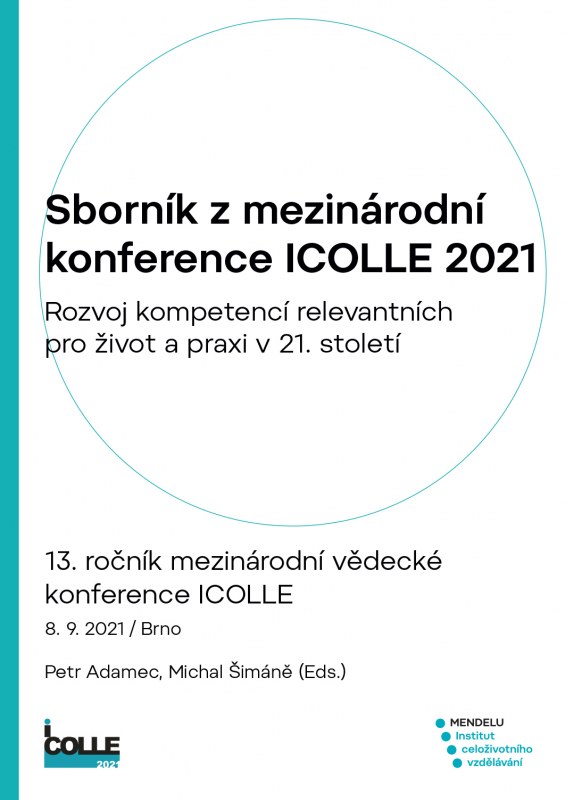
DOI: 10.11118/978-80-7509-832-0-0097
ČINITELÉ OVLIVŇUJÍCÍ BIOFILNÍ ORIENTACI UČITELE A JEHO PŘÍSTUP K (ENVIRONMENTÁLNÍ) VÝCHOVĚ
- Jana Létalová
The empirical study aims to cover the key factors which influenced the teacher´s biophile / pro‑environmental orientation, and his approach to the education, and subsequently provide his life picture for which the term bioprofile is used. In order to fulfill the goal of the study a qualitative approach was chosen. The group of respondents consisted of four teachers whose profiles corresponded with the set beforehand criteria. For data collecting and their analysis and interpretation the method of life history in combination with the narrative, phenomenological and hermeneutical approaches was used. The final bioprofile, which is mainly the result of the respondents´spontaneous narration, interlinks three related areas. These were detected within the process of the obtained data analysis and comparison. The submitted study offers a more complex view of pro-environmentally oriented teacher. Exploring the life history of each respondent, enabled us not only to identify the essential factors which influenced the teacher´s biophile orientation, but also to understand his personality and the way of his pedagogical thinking more deeper.
Keywords: biophile orientation of an individual, education, environmental education, biophile education, teacher´s approach to education, bioprofile
pages: 97-104, online: 2022
References
- Emmott, S. (2013). 10 Billion. London: Penguin Books Ltd.
- Franěk, M. (2006). Výzkum antropocentrických a biocentrických postojů k přírodě v české populaci. In: E. Strejčková (Ed.), Výzkum odcizování člověka přírodě: závěrečná zpráva (s. 47-64). Praha: Toulcův Dvůr.
- Hendl, J. (2016). Kvalitativní výzkum: Základní teorie, metody a aplikace. Praha: Portál.
- Horká, H. (2003). Výzkum faktorů ovlivňujících úroveň rozvoje ekopedagogické kompetence. In Sociální a kulturní souvislosti výchovy a vzdělávání: 11. výroční mezinárodní konference ČAPV: Sborník referátů [CD-ROM]. Brno: Masarykova univerzita, Pedagogická fakulta.
- Chawla, L. (1998). Significant life experiences revisited: a review of research on sources of environmental sensitivity. Journal of environmental education, 29(3), 11-21.
 Go to original source...
Go to original source... - Chawla, L. (1999). Life paths into effective environmental action. Journal of environmental education, 31(1), 15-26.
 Go to original source...
Go to original source... - Kullmuss, A., & Agyeman, J. (2002). Mind the gap: Why do people act environmentally and what are the barriers to pro-environmental behavior. Environmental education research, 8(3), 239-260.
 Go to original source...
Go to original source... - Krajhanzl, J. (2015). Psychologie vztahu k přírodě a životnímu prostředí. Brno: Lipka.
 Go to original source...
Go to original source... - Palmer, J. (1995). Influences on pro-environmental practices. In: J. Palmer, W. Goldstein, & A. Cumow (Eds.), Planning education to care for the earth (s. 3-8). IUCN, Gland, Switzerland and Cambridge, UK.
- Soukup, P., & Jandová N. (2001). Češi a životní prostředí (na okraj jednoho výzkumu). In: Šauer, P. (Ed.), Environmentální ekonomie, politika a vnější vztahy České republiky (s. 222-233). Praha: Nakladatelství a vydavatelství litomyšlského semináře.
- Steg, L., & Vlek, Ch. (2009). Encouraging pro-environmental behaviour: An integrative review and research agenda. Journal of environmental psychology, 29(3), 309-317.
 Go to original source...
Go to original source... - Strejčková, E., et al. (2005). Děti, aby byly a žily. Praha: Ministerstvo životního prostředí.
- Šmajs, J. (2016). Fenomén technika. Brno: Doplněk.
- Švaříček, R., & Šeďová, K. (2014). Kvalitativnî výzkum v pedagogických vědách. Praha: Portál.
- Tanner, T. (1980). Significant life experiences: A new research area in environmental education. Journal of environmental education, 11(4), 20-24.
 Go to original source...
Go to original source...


